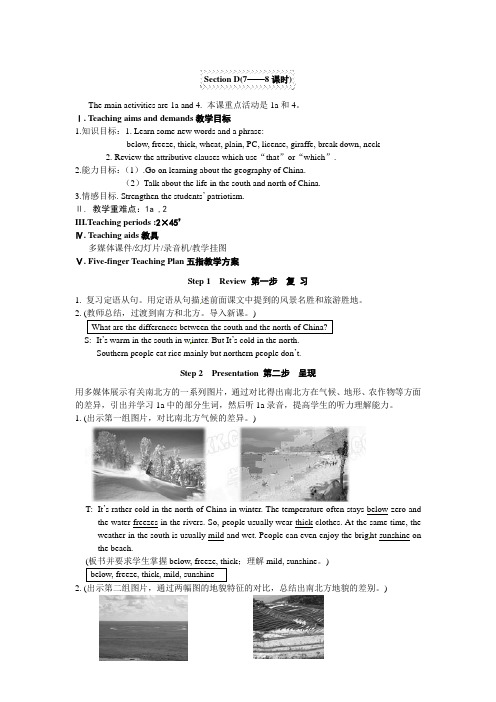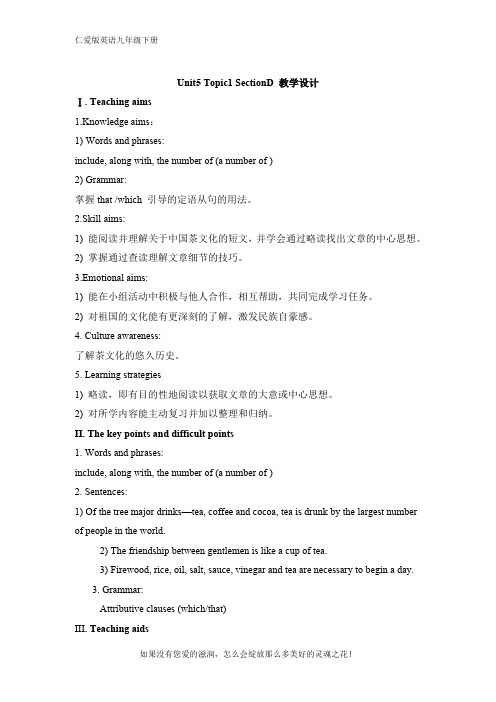仁爱英语九年级下册unit5topic1语言词汇知识点解析,知识点讲解
- 格式:doc
- 大小:61.50 KB
- 文档页数:9



Section D(7——8课时)The main activities are 1a and 4. 本课重点活动是1a和4。
Ⅰ. Teaching aims and demands教学目标1.知识目标:1. Learn some new words and a phrase:below, freeze, thick, wheat, plain, PC, license, giraffe, break down, neck2. Review the attributive clauses which use“that”or“which”.2.能力目标:(1).Go on learning about the geography of China.(2)Talk about the life in the south and north of China.3.情感目标. Strengthen the students’ patriotism.Ⅱ. 教学重难点:1a ,2III.Teaching periods :2×45’Ⅳ. Teaching aids教具多媒体课件/幻灯片/录音机/教学挂图Ⅴ. Five-finger Teaching Plan五指教学方案Step 1 Review 第一步复习1. 复习定语从句。
用定语从句描述前面课文中提到的风景名胜和旅游胜地。
What are the differences between the south and the north of China?s warm in the south in w inter. But ItSouthern people eat rice mainly but northern people don’t.Step 2 Presentation 第二步呈现用多媒体展示有关南北方的一系列图片,通过对比得出南北方在气候、地形、农作物等方面的差异,引出并学习1a中的部分生词,然后听1a录音,提高学生的听力理解能力。

基于“课程标准、屮招视野、两类结构”九(下)Unit5 Topic 1教案设计(复习课)制作学校:城关一中修订人:支艳丽一、复习目标确定的依据:1、课程标准相关要求:《英语课程标准》(2011年版)要求学生能够会读会写知汉意的单词和短语单词:attract, fetch, introduce, strange , height, guard , gradually , remain , separate ,enemy , expect, treasure , suppose , inducde , major , export, unique ........短语:It's said that ...... , expect to do sth , one of the +adj.最高级+ 町数名词复数,liein , be famous for / as / to .... , the second Iongest ......... ,语法:(1) that和which引导的定语从句用法。
(2)邀请和建议的句型及感叹句的句型结构2、教材分析:本节课为该话题的复习课,建议用1・2课时上完。
主要学习that,which引导的定语从句是本话题的语法重点。
在Section A的la, Mrs and Mr Green的女儿Susanna刚到中国, 对之了解较少,通过谈论中国的名胜古迹来考查、学习定语从句,并在Section A中2 部分,Section B,Section C设置了句型练习来巩固定语从句的用法。
3、中招考点:that和which引导的定语从句,是学生必须掌握的知识要点,所以一定要让学生弄明白定语从句的用法。
4、学情分析:本班学生英语学科基础较差,部分学生学习兴趣不是很足,而that和which引导的定语从句用法十分重要,鉴于这一点,上课前应当充分备足课,知识点应让学生一点一点地归纳出来,努力提高学生的学习兴趣。


课题:书法---写字基本知识课型:新授课教学目标:1、初步掌握书写的姿势,了解钢笔书写的特点。
2、了解我国书法发展的历史。
3、掌握基本笔画的书写特点。
重点:基本笔画的书写。
难点:运笔的技法。
教学过程:一、了解书法的发展史及字体的分类:1、介绍我国书法的发展的历史。
2、介绍基本书体:颜、柳、赵、欧体,分类出示范本,边欣赏边讲解。
二、讲解书写的基本知识和要求:1、书写姿势:做到“三个一”:一拳、一尺、一寸(师及时指正)2、了解钢笔的性能:笔头富有弹性;选择出水顺畅的钢笔;及时地清洗钢笔;选择易溶解的钢笔墨水,一般要固定使用,不能参合使用。
换用墨水时,要清洗干净;不能将钢笔摔到地上,以免笔头折断。
三、基本笔画书写1、基本笔画包括:横、撇、竖、捺、点等。
2、教师边书写边讲解。
3、学生练习,教师指导。
(姿势正确)4、运笔的技法:起笔按,后稍提笔,在运笔的过程中要求做到平稳、流畅,末尾处回锋收笔或轻轻提笔,一个笔画的书写要求一气呵成。
在运笔中靠指力的轻重达到笔画粗细变化的效果,以求字的美观、大气。
5、学生练习,教师指导。
(发现问题及时指正)四、作业:完成一张基本笔画的练习。
板书设计:写字基本知识、一拳、一尺、一寸我的思考:通过导入让学生了解我国悠久的历史文化,激发学生学习兴趣。
这是书写的起步,让学生了解书写工具及保养的基本常识。
基本笔画书写是整个字书写的基础,必须认真书写。
课后反思:学生书写的姿势还有待进一步提高,要加强训练,基本笔画也要加强训练。
课题:书写练习1课型:新授课教学目标:1、教会学生正确书写“杏花春雨江南”6个字。
2、使学生理解“杏花春雨江南”的意思,并用钢笔写出符合要求的的字。
重点:正确书写6个字。
难点:注意字的结构和笔画的书写。
教学过程:一、小结课堂内容,评价上次作业。
二、讲解新课:1、检查学生书写姿势和执笔动作(要求做到“三个一”)。
2、书写方法是:写一个字看一眼黑板。
(老师读,学生读,加深理解。
仁爱版九年级英语下单词表unit5 topic11.v.吸引,引起、、、的好感2.许多,大量3.v.(去)拿来,(去)请来4.v.介绍5.n.详情,全部细节6.adj. 奇怪的,陌生的7.n. 松树8.位于9.n. 长度10.n.瀑布11.n.高度,身高12.adj. 壮丽的,堂皇的13.adj.皇帝的,帝国的、14.v.刻,雕刻15.n.石头,石料,岩石16.v.守卫,保卫,看守17.n.天堂18.n.评论,v.做评论19.n.责任,义务20.adv.逐渐地,渐进地21.n.大理石22.adj.全部的,整个的23.n.支线,分支24.n.建筑物25.n.国家,州,政府,状态v.陈述,说明26.v.剩余,遗留,仍然是27.n.砖块,砖28.v.(使)分开,分离29.n.敌人,反对者30.v.预料,预期,期待,盼望31.n.财富,珍宝32.n.文明33.v.假定,假设,推断34.n.向往的地方,吸引力35.因、、、而著名36.adj.主要的,重大的37.n.出口产品,v. 出口38.adj.温和的,和煦的39.adj.独一无二的,独特的40.v.包含,包括41.n.话题,题目42.adj.举世闻名的43.n.木柴44.n.醋Topic 21.n.先锋,拓荒者2.n.思想家3.adj.明智的,高明的4.n.仁慈,善良5.v&n.影响6.pron.谁,什么人7.去世,消失8.v.统一,联合,团结9.v.击败,战胜10.建立,创建,设置11.n.帝国12.adv.永远,长久地13.结束14.n.船长,机长(海军)上校15.v.率领,领导,引领16.n.指南针,罗盘,圆规17.n.航行18.v.航行,起航19.n.海岸,海滨20.adv.不幸地21.n.出生22.n.贸易,买卖,交易,v.互相交换23.n.毕业24.adj.进一步的25.n.(大学)学位,度26.v.毕业,n。
毕业生27.n.研究员28.n.理论,原理29.n.祖国30.n.空白,空格,空白处31.n.机构32.n.主管,掌握v.要价,收费33.主管,掌管,负责34.n.宇宙飞船35.adj.相关的,有联系的36.n.青年,年轻人37.n.关爱,奉献,忠诚38.v.表达,表露39.n.事业,职业40.n.目的地,终点41.n.印刷,印刷术42.n.水手,海员43.n.发现44.n.烟花,焰火45.adj.东方的,东部的46.n.树皮,狗叫声v.狗叫47.n.破布,抹布48.n.墨水,油墨Topic 31.v.悬挂,吊2.n.形容,说明3.n.澳大利亚人4.adv&prep. 在…下面5.n.港口,港湾6.n.领导者,领袖7.n.展览,展出8.v.倾斜9.adj.私人的,私有的10.n.总统,国家主席11.发出清脆的响声12.n.奖,奖励,奖品13.n.一生,有生之年14.n.电报15.n.责任,义务,职责16.两者都不,也不17.conj.也不18.既不…也不…19.v.再婚20.n.继母21.n.许可证,执照22.n.律师23.v&n.信任24.adv. 很,非常,高度地25.n.从政者,政治家26.v.选举,推选27.爆发28.n.联邦,协会29.n.奴隶30.丢弃,摆脱,扔掉31.释放,解放32.v.开枪,射击33.拆开,解散,粉碎34.n.单元,单位35.n.步行者36.adv.向后,朝反方向37.n.担心,v.与…有关38.adj.满意的n.内容39.n.失败40.adj.简单的,短暂的41.n.功绩,成就42.n.坟墓,冢43.v.完成,结束adj.完整的,彻底的44.adj.科学的,关于科学的45.n.吨46.v.安装,修理47.n.工具48.n.不可理解的事,奥秘49.n.完成,竣工Review of unit 51.v.放牧,吃青草2.嘲弄,取笑,拿…开玩笑3.n.狼4.坚强的,强硬坚定的5.荣誉,光荣,赞美6.农民7.战斗,战役8.战场9.记忆力,记性,回忆10.纪念11.浪漫的,空想的12.故事13.国内外14.风景,景色Unit 6 Topic 11.宁愿,更喜欢2.女演员3.令人着迷的,吸引人的4.(有关)教育的5.科幻小说6.喜剧,喜剧片7.结尾,结局8.绘画,图画9.使命,天职10.冒险,冒险经历11.神秘的12.援救,营救13.奖,奖品,奖金14.典礼,仪式15.运动,移动16.导演17.大体的,普遍的18.足迹19.有才能的,天才的20.继续,占据(时间,位置等)21.教练22.正式地,正规地23.而不是24.组织25.目的,目标26.发展,进步27.总所周知28.因此,所以29.暴力,暴行30.暴力的,强暴的Topic 21.文字,文学作品2.最优秀的,典型的3.在某人看来4.克服,解决5.说法,陈述6.社团,协会,社会7.感人的,动人的8.诗集,诗歌9.诗人10.戏剧11.场面,片段12.吻,亲吻13.代表作,杰作14.地区,区域15.不像,与…不同,不同的16.彩虹17.最后,终于18.金黄色的19.丈夫20.宝贵的,珍惜的21.个人财产,拥有22.财产,财富23.链子,一系列24.突然的,忽然的25.突然,猛地26.减掉,切断27.经历…而幸存28.可能,或许29.梳子,梳理(头发)30.渴望31.搜寻,打猎,追捕32.目前33.两人,一对34.夫妻,情侣Topic 3 1.首先2.交换,交流3.粉笔4.十二个,一打5.很多,许多6.优秀,卓越7.很有价值的,很值钱的8.底,底部,底部的9.难以忘怀的,令人难忘的10.高兴,愉快,喜悦11.回忆起,12.竞赛,比赛13.风俗,习俗,习性14.祝贺15.机会,契机,可能性16.感谢的,感激的17.匆忙地18.拥抱,搂抱19.及时,来得及20.许诺,保证21.推断出,使结束Review of unit 5-61.英镑2.缺席的,不在场的3.活着的,在世的4.睡着的5.蚂蚁6.工作努力的,辛勤的7.醒着的8.除非9.真想,事实,实情10.操作11.用法说明,操作指南12.流,流动13.出现,起源,外观14.多泥的,浑浊的15.习语,成语16.争吵,争论17.直到…为止18.泥浆19.下沉20.回答,回应21.反应,回答。
Unit 5 Topic 1(考试时间:90分钟,满分:100分)第一部分听力(20分)Ⅰ.听句子,选择正确图片。
每个句子读一遍。
(5分)1. ______2. ______3. ______4. ______5. ______Ⅱ.听句子,选择正确答语。
每个句子读一遍。
(5分)( )6.A.Mount Ali. B.West Lake. C.Mazu Temple.( )7.A.Yes, I am. B.No, I don’t. C.Only a little.( )8.A.Yes, it is. B.No, it isn’t. C.Yes, it lies in Anhui.( )9.A.Mount Sun Moon. B.Sun Moon Lake. C.Sun Moon River.( )10.A.No, I haven’t. B.Yes, I do. C.Yes, I am.Ⅲ.听对话及问题,选择正确答案。
每段对话及问题读一遍。
(5分)( )11.A.Over 5,000 years. B.About 5,000 years. C.Less than 4,000 years.( )12.A.In the library. B.At home. C.In the office.( )13.A.The Foggy City. B.The Mount City. C.The Foggy City and the Mount City. ( )14.A.Yes, he does. B.No, he doesn’t. C.We don’t know.( )15.A.People don’t love the beautiful scenery. B.It’s worth seeing.C.You’re welcome to go there.Ⅳ.听短文,判断正(T)误(F)。
短文读两遍。
(5分)( )16.I went to Haikou to spend my summer holiday last year.( )17.There are a lot of ships in Haikou.( )18.It’s warm and rains a lot in Haikou.( )19.The number of Haikou’s population is about 1,000,000.( )20.I would like to go there again this year.第二部分基础知识运用(55分)Ⅰ.单项选择。
Unit 5 T opic 1 Section CThere are three beautiful places whi ch attact a great number of visitors to China every year . They are Hong Kong , Macao and Taiwan.Hong Kong returned to the motherland on July 1st , 1997 . It serves as a bridge which connects the mainland with the rest of the word . It i s known as the Pearl of the Orient and Shoppi ng Heaven . If you have a chance to go there , you shoul d vi sit Di sneyland , Ocean Park and Victori a Peak.When you hear the name , Macao , you may think of its gambling houses . People regard Macao as Gambling City . In Macao , you can also go on a visit to Mazu Temple and Ruins of St. Paul . Macao returned to the motherland on December 20th , 1999.Taiwan is consi dered the Treasure Island of China . The scenery there i s very beautiful . If you go there , you shoul d not mi ss Sun Moon Lake and Mount Ali . Y u can al so enj oy various delicious fruits there .Hong Kong , Macao and Taiwan are all important parts of our great country.If you come to China for a vi sit ,don’t miss them! Unit 5 T opic 1 Section DChina is a large country , and each part has its own features . Especially the north and the south are different in many ways.In winter , it’s rather and in the north of China . The temperature often stays bel ow zero and the water in the rivers freezes . Sometimes i t snows heavily and everything is covered with snow . People wear thi ck coats and gloves to do outdoor activities , such as making snowmen , throwing snowballs and going skating . And skiing is very popular in Heilongjiang . At the same time , the weather in the south i s usually mild and wet . People in Hainan can even go swimming in the sea and enj oy the bright sunshine on the beach.People’s way of life in the north i s also quite different from that i n the south.Northern peopl e are used to eating food that i s made with wheat flour , while rice ia the main food of southern people . Peopl e who live on the northern plains usually come and go by land , but people in the south travel not only by land but also by water .。
仁爱九年级Unit 5 China and the WorldTopic 1 China attracts millions of tourists from all over the world一.重要词汇1.重点词汇和短语:attract吸引,引起birthplace发源地,出生地fetch去取来,去带来introduce介绍detail详细strange奇怪有,陌生的pine松树length长,长度waterfall瀑布height高度,身高introduce 介绍,把...介绍给strange(adj)奇怪的height(n)高度,身高stone 石头,石料guard(V)保卫、守护、看守, treasure 宝藏、珍宝state 国家、洲remain 遗留、剩余, separate 分开,隔开, enemy 敌军, expect 期望,预料suppose 假定,猜想,认为, a great number of大量,许多in detail 相信地lie in 位于play an important part in 发挥重要作用扮演重要角色wear away磨损,消逝, separate...from使...和...分离, regard as 当作be famous for 因为...而出名along with...和..一起二.语法that/which 引导的定语从句。
三.重点句型及交际用语:1. China is a great country that has about 5000 years of history.2. There are many places of interest which attract millions of tourists from all over the world every year.3. There are a great number of rivers in China.4. I can fetch you Guide to China.5. It’s a book which introduces China in detail.6. It lies in Anhui Province.7. It’s a place w hich /that is worth visiting.8. It also plays an important part in Chinese festivals.9. The Great Wall is a treasure of Chinese civilization and it is regarded as a symbol of the Chinese nation.10. What is it famous for?任务型学习目标1.掌握that/which 引导的定语从句;2.会正确描述名山大川等名胜,并会表达赞同;3.了解我国的名山大川,风景名胜,雄伟建筑和悠久文化,增强学生的爱国之情;4.学会把含有定语从句的复合句变成两个简单句,以便于更容易地理解那些较长复合句的意思。
Section A1. China is a great country that has about 5000 years of history.由that 引导的定语从句,修饰先行词country,在句子作主语,不能省略,此时可以用which 替代eg: This is a book that/which tells spoken English.eg: There are some TV programs that/which are good for children.2. There are a great number of rivers in China.a number of 一些作定语+名词/代词复数形式作主语谓语动词用复数a great number of = a large number of/ large numbers of 大量,许多;eg: A great number of my _______ (friend) ______ (be) my classmates.the number of... ....的数量(数目)+ 复数名词谓语动词用单数eg:The number of my classmates _____ (be) 56.3. I can fetch you Guide to China. It’s a book which introduces China in detail.(1) introduce V 介绍,引见;introduce sb./sth.;introduce sb./sth. to sb.; introduce oneself to sb. 向某人自我介绍;eg: He introduced me to a Greek girl at the party.eg: Can I introduce myself? I’m Helen Brown.introduction N. 指示,说明eg: Read the introductions on the bottle before you take the medicine.eg: The introduction of steel made tall buildings easier to build.(2) in detail 详细地eg: He described the accident in great detail.4. It’s a mountain with lots of strange pine trees.(1) with 和它后面的部分构成介词结,作后置定语,修饰前面的名词eg: Do you know that girl with long hair?I went to rent a house with a garden.(2) strange adj. 奇怪的,陌生的stranger n. 陌生人eg: A strange thing happened this morning.eg: He stood in a strange street.5. It lies in Anhui Province. lie in 位于...内两者是包含关系;eg: Beijing lies in the north of China.6. Brink,fetch,take,carrybring 带来、拿来Bring me some books.take 带走、拿去May I take some books home?fetch 两个动作去拿来,来回= go and bring = get接双宾语fetch me that book. = Fetch that book to meGo upstairs and fetch me some books.Carry 表示“运载、“携带”之意,运送的方式很多,可以用车、船,也可以用手甚至用头They are carrying some paintings to the art gallery.他们正在把一些画搬到艺术馆去。
Section A对应课堂练习题I 根据句意,补全单词。
1. ---Tom, I don’t know that boy in a blue shirt. Can you i_______ him to me ?--- Oh, he is my cousin. His name is Victor.2. --- Your voice sounds a little s _____. What’s wrong ?--- I have a sore throat. Maybe I have a cold.3. --- Do you know Yao Ming ?--- Of course. He has a h_____ of 2.26 meters.4. --- Mount Yuntai lies in Henan Province. Millions of t______ visit it every year.5. The book is very interesting. It’s w______ reading.II 单项选择1. Xi’an is a great city ______ has many places of interest.A. whoB. that C .what D ./2. Today is Sunday. There are ______people in the park.A muchB the number ofC a great number ofD a lot3. Look, there is a guide over there. He is introducing the visitors the Palace Museum ____detail.A .of B. on C. with D. in4. Taiwan lies ______ the southeast of China. It’s a great place that is worth ______.A in; visitingB in; to visitingC to; visitD to; visiting5. I asked Danny to _____ me my book, but he brought me his book.A. takeB. fetch C .carry D .catchSectionA 课堂练习答案I 根据句意,补全单词。
1.introduce2.strange3.height4.tourists5. WorthII 单项选择1.B2.C3.D4.A5.BSection B1. What are those animals that are carved on the stones.(1) that在句子作主语,不能省略;(2)stone 石头,石料eg: The building is built of stone. 石料,不可数名词eg: I pick up a stone and threw it at the dog. 石头,可数名词2. It is said that they’re powerful animals which g uard the whole nation.guard 作为动词:保卫,守卫eg::It’s our duty to guard this bridge作为名词:警卫,警戒eg: I said to the guard that he had done right.eg: There are soldiers on guard at the gate.3. It also plays an important part in Chinese festivals.play a part 扮演角色= play a role 起作用,有影响;eg: The question of cost will play an important part in our decision.4. that/which 可以省略的情况:eg:1.He is looking for the book that/which was lost yesterday.2. The book (that/which) he bought yesterday is interesting.that/which 在定语从句中作为句子成分用法1.句在句中作主语不能省略;2.句在句子作宾语能省略;Section B 对应课堂练习题I. 单项选择。